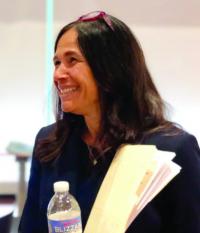May 9, 2019

Her approach: ‘Being out, and very present, to learn’
The newly selected superintendent of the Boston Public Schools, Brenda Cassellius, plans to be ready to dive deep into the community when she takes over the 54,000-student district on July 1. And community engagement will be on the former Minnesota education commissioner’s front burner as she travels between states as the school year winds down.
Beyond working on becoming a Red Sox fan – she’s already a hockey enthusiast – Cassellius told the Reporter that she wants to be a ready ear for students, teachers, parents, and other stakeholders as she acclimates herself to her new position.
“I would say the way that you acclimate is you show up, and you’re present, and you attend events that are put on by the community,” she said of the transition. “Make sure that you do that through all of the diverse communities, not just one sector or region, but do that equitably. That approach has worked for me: just being out and very present, to learn.”
In a 5-2 vote last Wednesday, the Boston School Committee selected Cassellius to replace interim superintendent Laura Perille, who assumed the office after Tommy Chang resigned last spring. City records show Chang’s base salary was $265,000 during his last calendar year as head of the city’s schools.
Cassellius’s long public educational history tracks mostly through her home state of Minnesota, where she worked as a social studies teacher, diversity coordinator, assistant principal, associate superintendent of secondary schools, superintendent of schools for the specialized East Metro Integration District, and, most recently education commissioner for the state of Minnesota.
She was in the running for another job as superintendent of the Michigan Department of Education, but decided to make the jump to Boston.
Running a large urban district is not yet an item on her resume, though she was a finalist in the search for the Minneapolis superintendent in 2016. She took the Boston job, for one thing, she said genially – because “they offered it to me.” Still, the district is an interesting opportunity for Cassellius.
“It’s a little bit more complex,” she said of her move to Boston. “I want that opportunity to really work on, and within, a community on kind of those in-school and out-of-school factors that contribute to closing achievement gaps.”
A mayorally controlled system offers the chance to “leverage cross-sector government control,” she said, highlighting areas where improvements can be made to mental health resources and health services for kids and noting the number of foster care placements in Massachusetts generally and her interest in exploring how it impacts BPS locally. She also cited refining the best ways to use city transportation services for students, or finding connections with housing supports.
“There are so many ways to leverage government services,” she said, “and that’s the beauty of having been commissioner for eight years… you don’t have to do it alone.”
She has not yet had a chance to talk to the mayor, Cassellius said last Friday. She knows she will be coming into the school system at a moment of long-term planning and increased scrutiny on equity of opportunity for students across neighborhoods. The public schools are trying to tackle declining enrollment and racial achievement gaps at the same time as they are fine-tuning grade configurations by working to effectively eliminate middle schools in the city.
“I plan on, and have already done, a lot of research,” she said, pointing to studies on racial disparities in the district schools, the Boston Globe’s valedictorian tracking project, and the “wealth gap that exists within communities, looking at integration and desegregation time there. All these are informative, but it’s just what you have on print, so you have to go talk to folks and see what the context is like, be in the community and hear the stories that give a richness to the studies and the data.”
Minnesota has always been “neck and neck” with Massachusetts in achievement, Cassellius noted. One of Boston’s draws is the marriage of “strategic and operational planning” through the first phases of BuildBPS, she said, where the “core work has been done,” adding, “That’s the homework I’ll be doing over the next 100 days and beyond to gauge where communities are at; to build on the things that are good and great, tried and poorly implemented, or tried and not resourced adequately.”
The possibility of open enrollment is not a new consideration for Cassellius. In a city where charter school reimbursements are lacking from the state, Boston education officials reckon with the cost of public charter schools every budget season.
“Minnesota has open enrollment laws – we’re the birthplace of charter schools – so I’m familiar with the conversation around charters,” she said. “I take a much more balanced approach to my feelings on them than either for or against them. As long as they’re educating children, I want to make sure they’re high quality schools.”
The Boston Public Schools have been roiled over the past years by budget walkouts, school closure rumors, surprise start-time reconfigurations that were later walked back, along with the annual push and pull over school funding and the bloat of transportation budgets.
Potential school closures and building renovations that are in line as part of the BuildBPS plan are something Cassellius intends to “look at more deeply. We have it on paper, but how does it align with what people are saying they want for equitable schools, and what are the tradeoffs we’re willing to make in return for richer educational opportunities?”
Fundamentally, she said, “programming should drive facility considerations.”
Topics:



